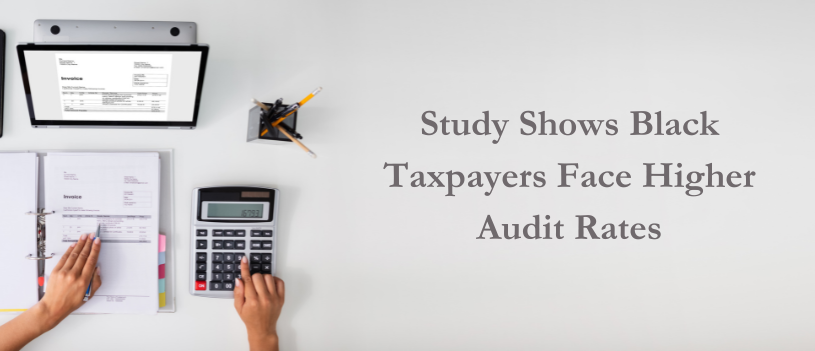Black CPAs were not surprised by a recent study revealing that the IRS is much more likely to audit Black taxpayers compared to non-Black taxpayers. These professionals have witnessed this disparity firsthand while working with their clients.
Now that the study, led by Stanford University, has confirmed their experiences, Black CPAs are advocating for a fairer tax system in the United States that does not intentionally or unintentionally target Black individuals.
They believe it is essential to examine and evaluate the algorithm used for audits and compare it to the demographics of audited individuals. By doing so, they can propose audit parameters that are not biased towards a higher proportion of Black people. According to Davita Pray, a CPA and firm owner from West Chester, Pa., it should not be difficult to identify audit flags that disproportionately target Black individuals.
Kimi Ellen, a CPA and firm partner from Chicago who is involved in various Black accounting organizations, agrees with the need for change. She points out that if one group of people is audited at least twice as often but does not represent twice the population, there is a clear problem. She believes that when better knowledge is available, appropriate actions should be taken.
The audit study was initiated following an executive order by President Joe Biden that required federal agencies to assess the equity impact of their programs. The U.S. Treasury collaborated with Stanford to analyze a massive dataset, including over 148 million tax returns and approximately 780,000 audits for the tax year 2014, resulting in an audit rate of 0.54%.
After the release of the Stanford study, President Biden issued another executive order on racial equity, emphasizing the need to address “algorithmic discrimination” in public institutions.
During a Senate Finance Committee hearing, IRS Commissioner Danny Werfel confirmed that he would submit a plan by the specified deadline to address the concerns raised in the study.
The study revealed that Black taxpayers were 2.9 to 4.7 times more likely to be audited than non-Black taxpayers. This disparity was evident even when examining the earned income tax credit (EITC), a program designed to support low- and moderate-income individuals. The audit focus on EITC recipients disproportionately targeted Black taxpayers, who accounted for 43% of EITC audits despite representing only 21% of EITC claims.
This racial imbalance persisted regardless of factors such as gender, marital status, or whether the claim included children. The study highlighted the most significant disparities for single male taxpayers, with audit rates of 7.73% for Black claimants compared to 3.46% for non-Black claimants when claiming dependents. Similar discrepancies were observed for single male taxpayers without dependents, with rates of 5.66% for Black claimants and 2% for non-Black claimants.
To overcome the lack of race and ethnicity data on tax returns, the researchers used voter registration records from North Carolina, where citizens were required to indicate their race and ethnicity when registering to vote.
Jean Wells, a CPA and tax attorney from Howard University, questions the IRS’s claims of racial neutrality, citing the outcomes of previous studies. For instance, an analysis of tax years 2012-2015 indicated that the highest audit rates in the country were found in predominantly Black counties in Mississippi, Alabama, and Louisiana. In contrast, the least-audited counties were located in states like Minnesota, New Hampshire, and Wisconsin.
The interviewed CPAs point out that they understand why the IRS may focus on Black families. For example, many Black families live in multigenerational homes where grandparents care for grandchildren and claim the EITC credit as the head of the household. This situation often results in differences in last names between the child and the head of the household.
James E. Heyward, a CPA from North Carolina, mentions a subculture of non-professionals offering tax preparation services in Black communities. These individuals, without proper credentials or experience, prepare tax returns without due diligence and care, potentially triggering audits. Heyward highlights that these unprofessional preparers take risks that licensed tax professionals would avoid.
Furthermore, Heyward notes that the IRS tends to focus on refundable credits, such as the EITC, as they attract more attention than individuals who owe taxes. The underfunding of the IRS exacerbates the issue. It is more cost-effective for the IRS to conduct correspondence audits on simple returns rather than auditing complex returns with thousands of pages.
Despite the higher audit rates for low-income taxpayers, auditing individuals in poverty will not effectively address the tax gap, which averaged $496 billion per year between 2014 and 2016, according to Wells. She suggests that the IRS should prioritize auditing high-wealth individuals and those with income from passthrough entities to generate substantial revenue rather than focusing on a few thousand dollars from low-income taxpayers.
IRS Commissioner Werfel agrees with this perspective. He stated that the agency would use the funding provided by the Inflation Reduction Act of 2022 to concentrate on audits of high-wealth taxpayers, corporations, partnerships, and complex partnerships. Werfel assured that audit rates for taxpayers earning less than $400,000 per year, which were historically low in 2018, would not increase.
During a Senate Finance Committee hearing, Werfel emphasized the IRS’s commitment to fairness, acknowledging that it is crucial for the tax system to be fair. Although the IRS’s response to the study’s findings was still being developed, the agency was actively addressing questions related to the corrective action plan for the EITC and the audit rates disparity between Black and non-Black taxpayers.
The interviewed CPAs, such as Pray, stressed that targeting vulnerable individuals and families would not provide a comprehensive solution. They urge for an equitable approach that ensures equal treatment for all taxpayers.
Black CPAs: IRS must end higher audit rates for Black taxpayers – Journal of Accountancy
